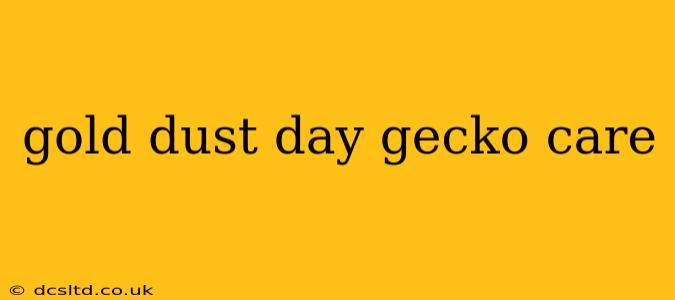The Gold Dust Day Gecko ( Phelsuma laticauda ) is a stunning reptile, captivating with its vibrant green scales speckled with gold. These geckos, native to Madagascar, are increasingly popular in the pet trade, but their care requires a commitment to replicating their natural environment. This comprehensive guide will cover everything you need to know to provide optimal care for your Gold Dust Day Gecko.
What Do Gold Dust Day Geckos Eat?
Gold Dust Day Geckos are insectivores. Their diet should consist primarily of appropriately sized insects, such as crickets, mealworms, and roaches. It's crucial to dust these insects with a high-quality calcium and vitamin D3 supplement before feeding to ensure your gecko receives the necessary nutrients for healthy bone growth and overall wellbeing. Variety is key; avoid feeding solely one type of insect. Occasional supplementation with small amounts of fruit purees (like mango or banana) can also be provided, but should not constitute a significant portion of their diet. Overfeeding can lead to obesity, so moderation is crucial.
How Big Do Gold Dust Day Geckos Get?
Adult Gold Dust Day Geckos typically reach a length of 4-6 inches (10-15cm), with females generally being slightly smaller than males. Their size makes them relatively manageable pets, but their vivarium still needs to be appropriately sized to accommodate their activity level and natural behaviors.
Gold Dust Day Gecko Enclosure Setup: The Ideal Habitat
Creating an appropriate enclosure is paramount for the health and wellbeing of your Gold Dust Day Gecko. They require a tall terrarium, rather than a wide one, to allow for vertical climbing. A 18x18x24 inch enclosure is a suitable size for a single adult, but larger is always better. The enclosure should include:
- Substrate: Paper towels are a simple and hygienic option, easily cleaned and replaced. However, some keepers prefer a blend of coconut fiber and cypress mulch. Avoid substrates that could be ingested and cause impaction.
- Branches and Plants: Provide plenty of climbing opportunities with sturdy branches of varying thicknesses and heights. Live plants, such as pothos and bromeliads, are ideal for creating a naturalistic environment and providing hiding places.
- UVB and Heat: A high-quality UVB lamp (5.0 or 10.0) is essential for proper calcium absorption and overall health. A heat source, such as a ceramic heat emitter or heat mat (placed externally to prevent burns), is also necessary to maintain a temperature gradient within the enclosure. The warm side should be around 85-90°F (29-32°C), and the cool side around 75-80°F (24-27°C). A thermometer and hygrometer are crucial for monitoring temperature and humidity levels.
- Humidity: Gold Dust Day Geckos need high humidity, typically around 60-80%. Regular misting or the use of a fogger may be necessary to maintain appropriate humidity levels.
How Long Do Gold Dust Day Geckos Live?
With proper care, Gold Dust Day Geckos can live for 8-10 years, sometimes even longer. Providing a suitable environment, a varied diet, and regular monitoring are crucial factors in maximizing their lifespan.
How Much Does a Gold Dust Day Gecko Cost?
The cost of a Gold Dust Day Gecko can vary depending on the breeder and the gecko's age and quality. Expect to pay anywhere from $50 to $150 or more. Remember that the initial cost of the gecko is just a small portion of the overall expense. You'll also need to factor in the cost of the enclosure, lighting, heating, and ongoing feeding costs.
Are Gold Dust Day Geckos Good Pets for Beginners?
While relatively easy to care for compared to some other reptile species, Gold Dust Day Geckos are not necessarily ideal for absolute beginners. Their needs regarding humidity, temperature, and UVB lighting require some understanding of reptile husbandry. Research and careful planning are essential before bringing one home.
What Diseases Do Gold Dust Day Geckos Get?
Like all reptiles, Gold Dust Day Geckos are susceptible to certain diseases. Common issues include metabolic bone disease (MBD) caused by inadequate calcium and UVB, parasitic infections, and respiratory infections. Regular veterinary checkups by a reptile specialist are recommended to detect and address any potential health problems early.
By following these guidelines and dedicating yourself to providing a suitable environment, you can ensure a happy and healthy life for your Gold Dust Day Gecko. Remember to research further and consult with experienced reptile keepers or veterinarians for additional advice and support.
